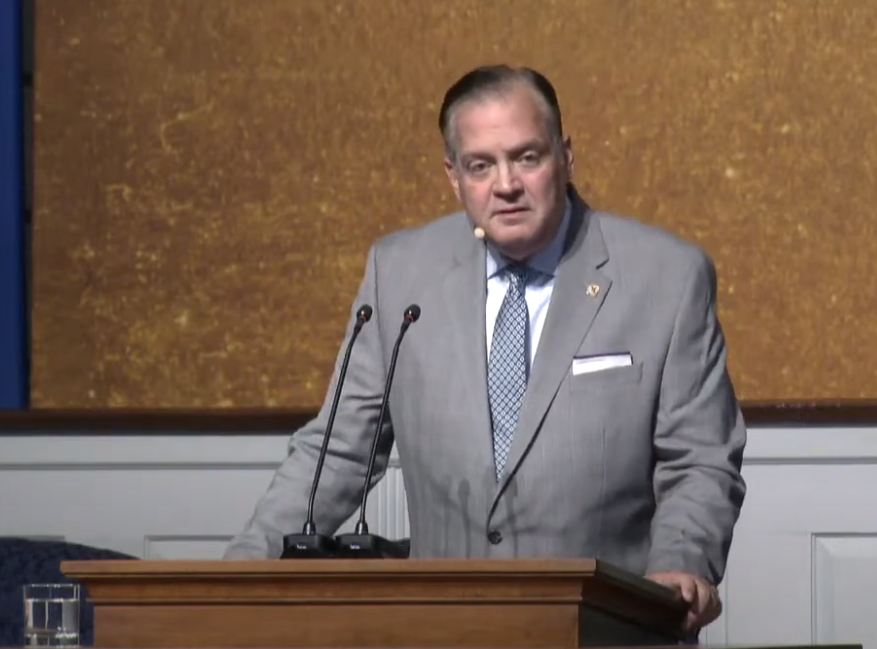
Dr. Albert Mohler speaks about Ed Litton’s plagiarism and how pastors, theologians and the Southern Baptist Convention should respond.
Dr. Albert Mohler says Ed Litton is not a good example for SBTS students.
SBTS President Albert Mohler says SBC & Evangelicalism faces ‘Crisis of Manufactured Sermons.’
Southern Baptist Theological Seminary President Albert Mohler said he is alarmed by plagiarism among Southern Baptist pastors when asked about the Ed Litton Sermongate scandal. In a long reply to the question, Mohler said some megachurches appear to be receiving “manufactured sermons” and that is a crisis for evangelicals.
Mohler responded to a student question during the SBTS President’s Forum this morning. Mohler was asked how pastors, students and the SBC should respond to the Ed Litton plagiarism scandal.
“Plagiarism is a very serious thing,” Dr. Mohler told his students at the Southern Baptist Theological Seminary. Mohler began his answer by carefully defining plagiarism and the way pastors should approach the issue of both theft and the fraud of passing off another sermon as someone else’s.
“My alarm is about the state of preaching in the Southern Baptist Convention and the larger Evangelical world,” Mohler said. “How much of this is happening? How many congregations are not hearing biblical exposition, faithful exposition, coming not only in the voice of their preacher but through that preacher’s serious, studious, arduous and joyous engagement with the text? This is a crisis that I think we face, and this news story has now brought to us.”
Dr. Mohler said some megachurches “appear to be receiving manufactured sermons.”
“Many evangelical churches, Some, especially big evangelical congregations appear to be receiving what I can only describe as manufactured sermons,” Mohler said. “It is like there is now a process of manufacturing sermons in which the person delivering the sermon is not even at the center of activity or is so only at the end as if someone else does the engagement with the text and someone else does the basic thoughtful structure of the sermon and someone else provides the outline and someone else provides the summary of the text and someone else provides even the illustrations. And in some cases, someone else provides the sermon. And now we have firms engaged in the activity of at least parts of that if not the whole. I think there are huge problems with that. I don’t think that is the biblical model of preaching.”
And the Ed Litton Sermongate scandal that was covered even by the New York Times highlights this, according to Mohler.
“Looking at this crisis of manufactured sermons, it doesn’t appear at all to be consonant with the model of preaching in the New Testament and with the church’s humble understanding of preaching throughout the Christian centuries” Mohler said. “This particular news story has revealed the fact that it is evidently increasingly common in many circles for manufactured sermons be pretty much Sunday by Sunday the norm. I think that is something that should alarm us.”
Mohler said that this “Age of Manufactured Sermons” could explain why so much of today’s evangelical preaching is “Slick” while lacking substance.
Mohler said SBTS takes plagiarism seriously. He said during his tenure as president the school rescinded a Ph.D. for plagiarism and has expelled students over this issue too. Mohler pointed out that for many years, (as the Capstone Report has detailed previously) that SBTS banned the use of professional research services.
“We do not offer a single manufactured degree,” Mohler said. “We do not offer a single manufactured course. We do not want manufactured graduates.”
Then, he drilled down into more specifics about the Ed Litton Sermongate scandal and the SBC.
“There simply is no doubt that this conversation we’re having right now is occasioned by the fact that the president of the Southern Baptist Convention, Dr. Ed Litton, has been involved to some degree in preaching someone else’s sermon. Beyond that we can see the whole issue of the kind of manufacture of sermons that is now widespread. I would simply have to say that that is precisely not what we are trying to teach or to hold up as an example here,” Mohler said.
Mohler continued, “You asked what does this mean for someone who is the president of the Southern Baptist Convention. And that is where I have to answer that question in the only way I know with integrity and in propriety to answer since this isn’t one seminary president speaking of one president of the SBC, but we were in an election together. And he won. The Southern Baptist Convention elected Dr. Litton as president, and no doubt because of his many gifts. This is an issue that I have to leave between the Southern Baptist Convention and its president. The Southern Baptist Convention alone decides who it’s president shall be. And the Southern Baptist Convention meeting in Nashville decided that Dr. Litton would be its president.”
Now, is that the end of the issue?
“From this point onward about that role, that has to be between Dr. Litton and the Southern Baptist Convention. And I of all people, should not imply that I know the answer to that question. Nor that the Southern Baptist Convention would ask me that question,” Mohler said. “I have to do my best to act honorably and to be honorable in the situation. I hope I have. It would not be honorable to fail to answer the question you asked. It would not be honorable, I think, for me to take it where some would like me to take it.”
